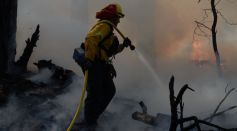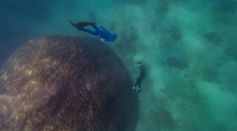ENVIRONMENT & CLIMATE

Swiss Experts Examine Elephant’s Biomechanical Trunk Flexibility Through LOTR and Avatar 3D Camera
San Nicolas Island Fox Subspecies At Low Risk of Extinction; Island of the Blue Dolphins Sheds Light to This Declining Mammalian Population
Tetrapods Older Than Initial Records; Have Fastest Aquatic to Land Vertebrate Evolution Rate Recorded
Tortoise Diet: Watch How This Giant Reptile Goes in for the Kill for Its Not-so-Usual Meal
Mesospheric Ozone Layer Depletion: What Role Does It Play in the Global Climate Change?
Triantha Occidentalas: Flowering Plant Eats Insects Walking up Its Sticky Stalk

Energy Efficiency in US Buildings Could Decrease Thousands of Annual Premature Deaths Due to Particulate Matter

Wildfire Containment: Here’s Why It Sometimes Takes Long to Put the Flames Out
Mammoth Fossil Found in Florida; Another Leg Bone Discovery in the State from Prehistoric Period

Largest Coral 'Muga dhambi' Discovered in Goolboodi, Great Barrier Reef
Largest Carbon Reservoir: New Study Estimates Deposit in Earth’s Outer Core
Billion-Year Geologic Record Gap: Grand Canyon's Great Unconformity Possibly Due to Rodinia's Breakup
Geothermal Activity Under Antarctic Ice Sheet Bring Thwaites Glacier on Brink of Collapse Due to Excessive Melting

Four Storms, Wildfires Over North American Continent Captured Via Satellite Imaging
Most Popular

How Strong Are Tornadoes? Understanding the EF Scale and the Extreme Power Tornadoes

Glaciers Are Melting Fast: Climate Change Impact Driving Sea-Level Rise Worldwide

How Telescopes Work: Optical vs Radio vs Space Telescope Science Explained

Can the World Run Out of Water? Water Scarcity Science and Climate Impact Explained




